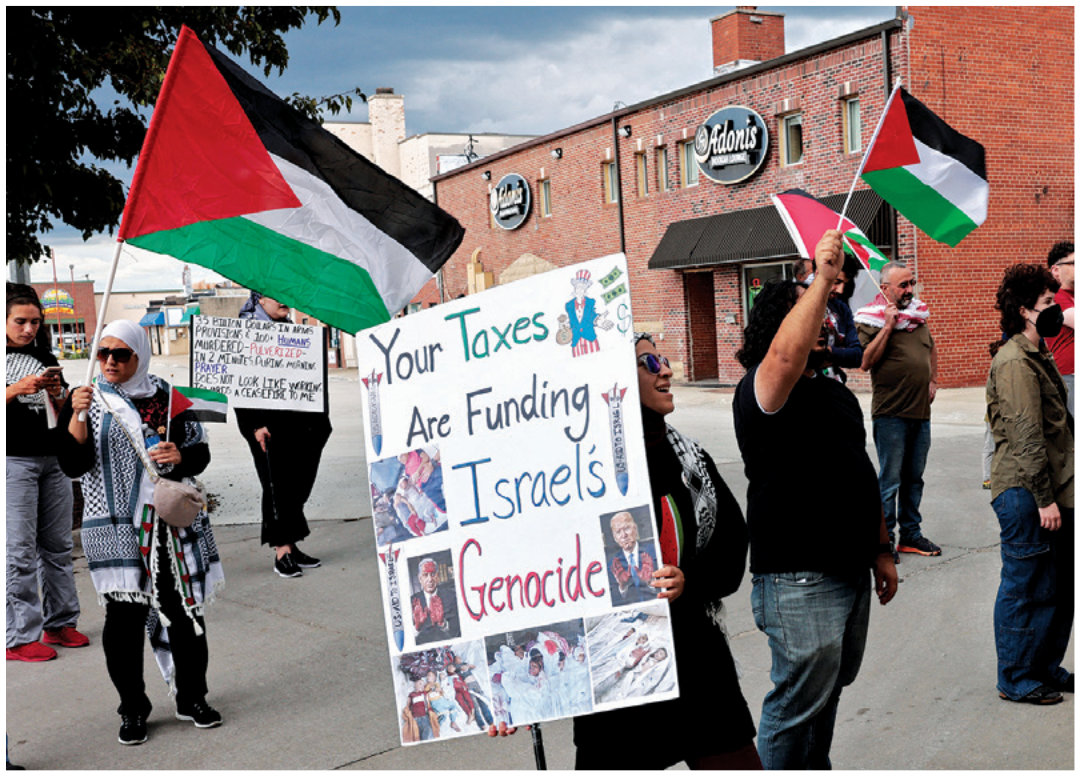BEIRUT: Hezbollah said Saturday that a second senior commander was among 16 fighters killed in an Israeli air strike on its Beirut stronghold the previous day, highlighting the scale of the blow to its military leadership.
Israel said Friday’s strike on the southern suburbs of Lebanon’s capital killed the head of Hezbollah’s elite Radwan Force, Ibrahim Aqil, and several other commanders.
At least 31 people were killed in the airstrike, the Lebanese health ministry said on Saturday, including three children and seven women, in the deadliest strike in a year of conflict between Hezbollah and Israel.
Coming hot on the heels of sabotage attacks on communications devices this week that killed 37 people in Hezbollah strongholds, the strike raised new questions about the Iran-backed group’s security arrangements and dealt a heavy blow to its fighters’ morale.
Hezbollah named the second commander as Ahmed Mahmud Wahbi, saying he had headed the group’s operations against Israel from the onset of the Gaza war in October until the start of this year.
Confirming the death of Aqil, who was wanted by the United States for involvement in the 1983 bombing of the US embassy in Beirut, Hezbollah hailed him as “one of its great leaders.”
AFP journalists said Friday’s strike left a massive crater and gutted the lower floors of a high-rise building.
It was the second Israeli strike on the Hezbollah military leadership since the start of the Gaza war. An Israeli strike on Beirut in July killed Fuad Shukr, a top operations chief for the movement.
It also followed sabotage attacks on pagers and two-way radios used by Hezbollah on Tuesday and Wednesday, which killed 37 people and raised fears of a wider war.
Stephane Dujarric, spokesman for UN Secretary-General Antonio Guterres, said the world body was “very concerned about the heightened escalation” and called for “maximum restraint” from all sides.
The Israeli military said it conducted a “targeted strike” against Aqil, which a source close to Hezbollah said killed a total of 16 Radwan Force members.
The source said Aqil was “at a meeting with commanders” when he was killed.
The United States had offered a $7 million reward for information on Aqil, describing him as a “principal member” of an organization that claimed the 1983 embassy bombing, which killed 63 people.
Regional escalations
Israeli troops and Hezbollah fighters have battled each other along the Israel-Lebanon border since Hamas militants triggered the war in Gaza with their October 7 attack.
The focus of Israel’s firepower for nearly a year has been on Gaza, but with Hamas much weakened, that focus has now moved to Israel’s northern border.
Defense Minister Yoav Gallant said Israel’s “enemies” would find no refuge, not even in Beirut’s southern suburbs.
Israeli military spokesman Daniel Hagari said after the strike that Israel was “not aiming for a broad escalation in the region.”
But Hamas called it a “brutal and terrorist aggression” and an “escalation.”
Iran’s foreign ministry accused Israel of seeking to “broaden the geography of the war.”
Iran's Supreme Leader, Ayatollah Ali Khamenei, said that Israel is committing “shameless crimes” against children, not combatants.
Months of near-daily cross-border exchanges have killed hundreds in Lebanon, most of them fighters, and dozens in Israel, forcing tens of thousands on both sides to flee their homes.
The latest blow to Hezbollah came after thousands of Hezbollah operatives’ pagers and walkie-talkies exploded over two days, killing 37 people and wounding thousands.
Hezbollah chief Hassan Nasrallah vowed on Thursday that Israel would face retribution for those blasts.
Before Friday’s Beirut strike, Israel said Hezbollah had fired dozens of rockets from Lebanon following air attacks that destroyed dozens of the militant group’s launchers.
Speaking to troops on Wednesday, Gallant said “Hezbollah will pay an increasing price” as Israel tries to “ensure the safe return” of its citizens to border areas.
“We are at the start of a new phase in the war,” he said.
Aqil’s Radwan Force spearheaded Hezbollah’s ground operations, and Israel has repeatedly demanded through international mediators that its fighters be pushed back from the border.
Delayed visit
Israeli Prime Minister Benjamin Netanyahu delayed by a day his scheduled departure to the United States, where he is due to address the UN General Assembly.
On Friday the UN’s High Commissioner for Human Rights, Volker Turk, told the Security Council the attack on Hezbollah communications devices violated international law and could constitute a war crime.
The pagers and walkie-talkies exploded as their users were shopping in supermarkets, walking on streets and attending funerals, plunging Lebanon into panic.
“I am appalled by the breadth and impact of the attacks,” said Turk, adding that it “is a war crime to commit violence intended to spread terror among civilians.”
International mediators, including the United States, have been scrambling to stop the Gaza war from becoming an all-out regional conflict.
Hamas’s October 7 attacks that sparked the war resulted in the deaths of 1,205 people, mostly civilians, on the Israeli side, according to an AFP tally based on Israeli official figures that include hostages killed in captivity.
Out of 251 hostages seized by militants, 97 are still held in Gaza, including 33 the Israeli military says are dead.
Israel’s retaliatory military offensive has killed at least 41,272 people in Gaza, most of them civilians, according to figures provided by the Hamas-run territory’s health ministry. The United Nations has acknowledged the figures as reliable.

































